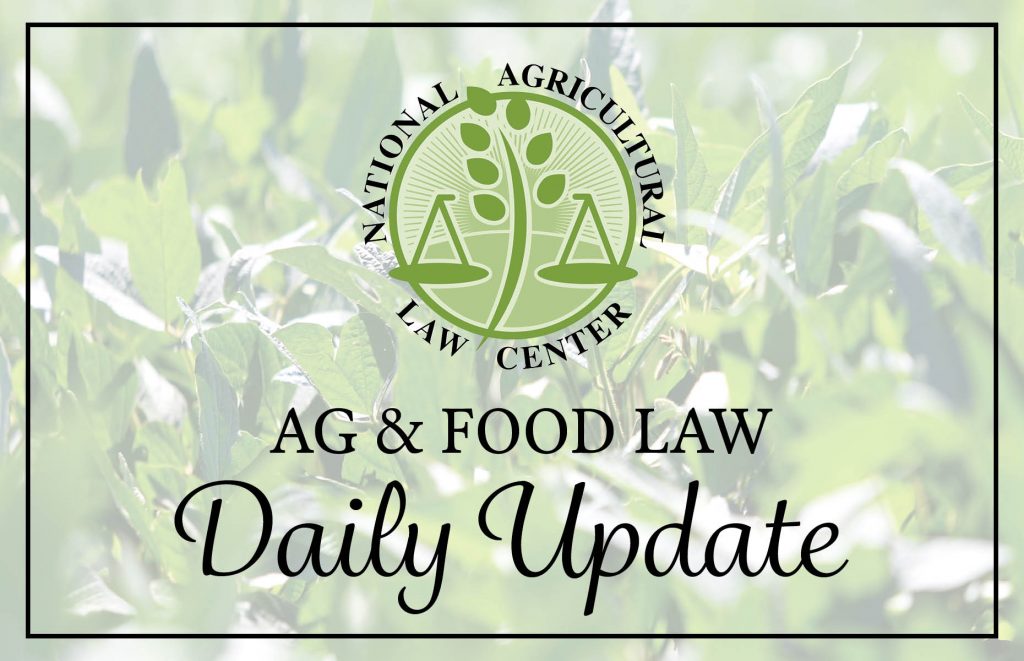A comprehensive summary of today’s judicial, legislative, and regulatory developments in agriculture and food. Email important additions HERE.
JUDICIAL: Includes antitrust law, the Sherman Act
In In re Cattle Antitrust Litigation, No. CV 19-1129 (JRT/HB), 2020 WL 5764314 (D. Minn. Sept. 28, 2020), the court has granted the defendant’s motion to dismiss several of the plaintiffs’ claims. The case is a consolidation of several separately filed actions alleging that the defendants, the largest meat-packers in the United States, conspired to fix and suppress the price of cattle in violation of federal and state antitrust laws. The defendants moved to dismiss the plaintiffs’ claims, arguing that the plaintiffs had failed to provide enough evidence to show that the claims should be considered. When reviewing a motion to dismiss, the could will consider all the facts alleged in the complaint as true and determine whether the complaint “states a claim for relief that is plausible on its face.” If not, then the court will dismiss.
The plaintiffs raised claims against the defendants under the Sherman Act. To successfully bring a claim under that Act, the plaintiffs needed to allege either (1) direct evidence of a conspiracy, or (2) demonstrate that the defendants shared a unity of purpose or other meeting of the minds. The court concluded that the plaintiffs had failed to sufficiently allege either type of evidence. First, although the plaintiffs presented claims from confidential witnesses as direct evidence, the court concluded that the statements offered by the witnesses lacked sufficient detail to serve as direct evidence. Second, the evidence presented by the plaintiffs to show that the defendants had a meeting of the minds to fix prices were easily explained by economic evidence presented by the defendants. The court went on to dismiss the state law claims brought by the plaintiffs, also for a lack of evidence. While the plaintiffs’ claims have been dismissed, the court did grant the plaintiffs leave to amend their complaint. This means that the plaintiffs will have a chance to try to alter the complaint so it reflects the evidence necessary to bring their Sherman Act claims.
REGULATORY: Includes NOAA, RBS
NATIONAL OCEANIC AND ATMOSPHERIC ADMINISTRATION
Proposed rule establishes the 2021-22 harvest specifications for groundfish taken in the U.S. exclusive economic zone off the coasts of Washington, Oregon, and California, consistent with the Magnuson-Stevens Fishery Conservation and Management Act and the Pacific Coast Groundfish Fishery Management Plan (PCGFMP). Info here.
RURAL BUSINES COOPERATIVE SERVICE
Final rule correction On July 14, 2020, Rural Development’s Rural Business-Cooperative Service, Rural Housing Service, and Rural Utilities Service referred to as “the Agency” or “Agency” promulgated the OneRD Guaranteed Loan regulation. Following final implementation of this final rule, the Agency found that corrections due to error, omissions, or need for clarity were necessary. Info here.
LEGISLATIVE: Includes California
CALIFORNIA
AB 1788 amends the California Ecosystems Protection Act of 2020 by prohibiting the use of any second generation anticoagulant rodenticide in certain locations to reduce adverse effects to nontarget wildlife and also expand the exemption for agricultural activities. Info here.
CALIFORNIA
SB 86 requires the Department of Pesticide Regulation to prepare and submit quarterly reports regarding granular chlorpyrifos use, monitoring, and exposure of the pesticide. Info here.
